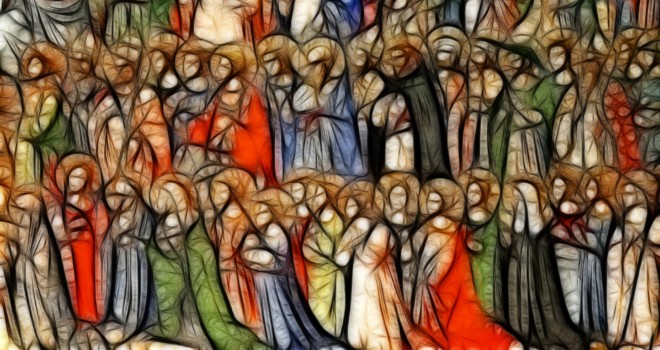
By The Reverend Canon Dr. William J. Danaher, Jr., Rector
23 years ago, when I was in the ordination process, I learned to say the Eucharist from Father Bill Penny, an older priest I worked with one summer. Father Penny was gradually going blind, and he needed assistance in getting ready and negotiating the church. He was an incredibly kind man, and the memory of walking beside him and guiding him physically, as he guided me spiritually, stays with me every Sunday when I celebrate the Eucharist.
Father Penny said the Eucharistic prayers from memory. Standing next to him at the altar, I noticed that he often skipped parts in the prayers and mixed up one prayer with another. Despite these mistakes, his prayers were always beautiful and powerful. People were touched by the way he celebrated the Eucharist, and often mentioned that as they left church. When I asked him why he thought that was so, he said to me, “I know that I can’t see like I used to, and soon I won’t be able to see at all. But the most import thing to do when celebrating the Eucharist is to pray the words fully, not just say them correctly.” And so I did and have tried to do. When people compliment the way I celebrate communion, I think of Father Penny.
I also think of him every All Saints’ Day. What does it mean to be a saint? In the Roman Catholic tradition, saints are people who have lived uniquely holy lives — lives that shine brightly with the light of Christ, so brightly that they continue to draw people closer to God after they die. Thus, in the Roman Catholic tradition, people pray to saints, asking them for help and assistance. In the Protestant tradition, saints refer to the widest possible circle of believers. Saints are not uniquely holy, but ordinary people who we know and love in all their beautiful but broken humanity. Everyone who manifests the love of God in their lives, then, is a saint in the Protestant tradition.
Episcopalians try to find a middle way between these two positions. We lift up the lives of holy people who have been lights in their generation. But the reason we lift them up is not because we hope that they would somehow intercede for us, but because their lives are an example of what it means to live fully and completely for Christ. The saints surround us as witnesses to what we are, and might be, through God’s grace. On All Saints’ Day, we give thanks for these grace-filled people, even as we remember that each of us has been called by grace.
Art: Adaptation of The Forerunners of Christ with Saints and Martyrs, orr. Fra Angelico 1423-4